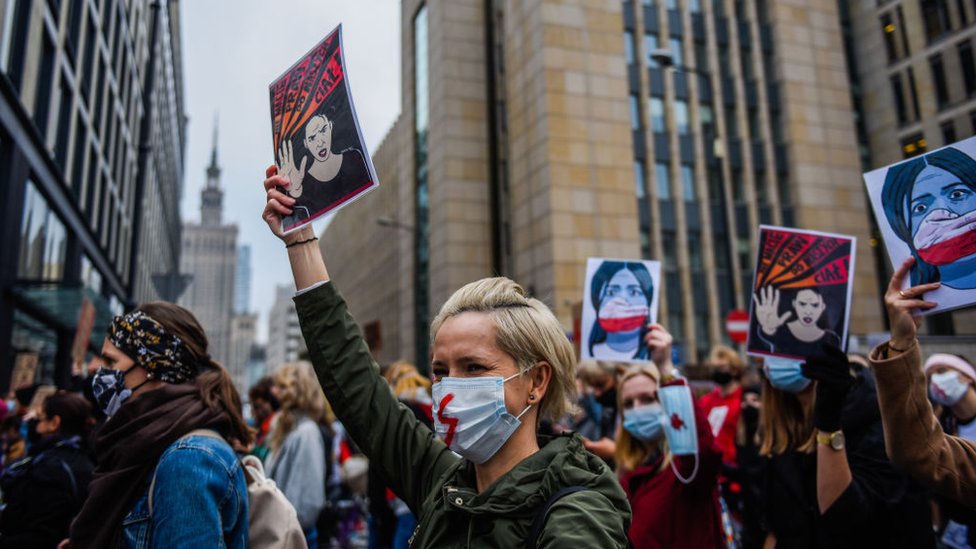A strike is under way in Poland by women opposed to a court ruling that introduced a near-total ban on abortion in the mainly Catholic country.
Crowds have protested in several cities for the seventh-day running against the decision that outlawed terminations on the grounds of severe health defects.
An opinion poll conducted for Gazeta Wyborcza suggested that 59% of those surveyed disagreed with the change.
The powerful ruling party leader said the decision could not be reversed.
Jaroslaw Kaczynski, who is also the deputy prime minister and widely considered to be the country’s real powerbroker, said the protests were an attempt to “destroy” Poland. He urged people to “defend” the nation as well as the Catholic Church.
Last Thursday’s ruling by the Constitutional Court closed one of the few remaining legal grounds for abortion in Poland, and followed a legal challenge by MPs from the ruling nationalist Law and Justice party (Pis) last year.
Polish opinions on near-total abortion ban
The decision means terminations are only valid in cases of rape or incest, or to protect the mother’s life. Opponents say it puts women at risk by forcing them to carry a baby that is unlikely to survive birth.
But supporters insist it will prevent the abortion of foetuses diagnosed with Down’s syndrome. The ruling cannot be appealed against but only comes into force after it is published in the official gazette though it is not clear when that will happen.
What’s the latest on the protests?
The organisers said many firms had agreed to let women employees take the day off in a protest inspired by a women’s strike in Iceland in 1975 and resembling another Polish demonstration held in 2016.
But with no reliable figures available it was impossible to say how widespread the strike was, the BBC’s Adam Easton in Warsaw reports.
Street demonstrations are being held in several cities across the country, with tens of thousands of people in attendance, local media report. In the capital, Warsaw, people chanted “this is war”.
Speaking to the BBC, Deputy Foreign Minister Pawel Jablonski said the ruling protected the unborn from discrimination on the grounds of health defects.
“It’s a cruel thing to do, to kill unborn children on the basis of the fact that they may carry a Down’s syndrome… Should we discriminate against people with Down’s syndrome? These people have the exact same right as every other human being,” he said.
On Tuesday, scuffles erupted in parliament, with centrist and left-wing MPs holding up placards saying “shame” and shouting pro-choice slogans at Prime Minister Mateusz Morawiecki.
The conservative speaker of parliament compared the red lightning bolt that is symbol of the protest movement to Nazi imagery.
Agnieszka Dziemianowicz-Bak, a left-leaning MP, told the BBC: “We tried to show solidarity with the protesters that filled up the streets and demanded what they’re demanding… a real debate about the full reproductive rights for women.”
But in a video message on Facebook, Mr Kaczynski said no other ruling by the court could have been consistent with the constitution, which has an article saying the country “shall ensure the legal protection of the life of every human being”.
Opposition Civic Coalition leader Borys Budka reacted by saying that words calling for “hatred, inciting civil war and using party forces to attack citizens are a crime,” according to AP news agency.
Earlier, Mr Morawiecki called for an end to the demonstrations, saying protesters were disregarding “massive risks” from the coronavirus pandemic.
He added: “The freedom of choice truly is a fundamental thing but we should all agree that in order to have this freedom of choice, one needs to be alive. The one who is dead cannot implement one’s right of freedom of choice.”
What’s the background?
Abortion is a deeply divisive issue in Poland, which already had one of the strictest laws in Europe. A 2014 opinion poll by the CBOS research centre found that 65% of Poles surveyed were against abortion, 27% saw it as acceptable and 8% were undecided.
However, for years opinion polls have found a clear majority against the latest tightening of the law.
There are just over 1,000 legal abortions every year in Poland, but women’s groups say the number of abortions carried out illegally or abroad could be between 80,000 and 120,000.
Almost all legal abortions – 98% last year – have so far been carried out on grounds of severe foetal defect, which has now been ruled out as a valid reason.
Observers say the government and the PiS seem to have been taken by surprise by the size of the protests, which have also contributed to unusually strong criticism towards the Catholic Church.
The influence of the Church is waning among younger generations, and the protests have been attended by large numbers of young women. On Sunday, groups targeted churches and some services were disrupted.
There is also anger at the way the government pushed the change through without parliamentary debate or public consultation.




